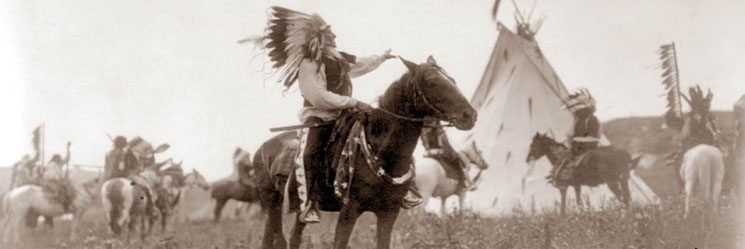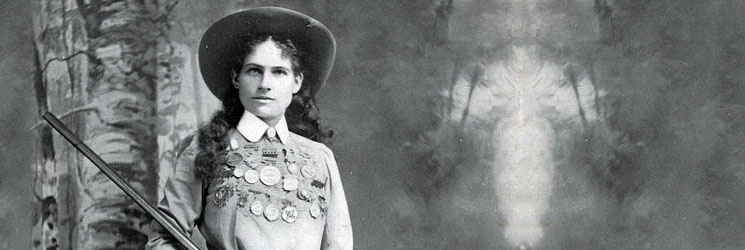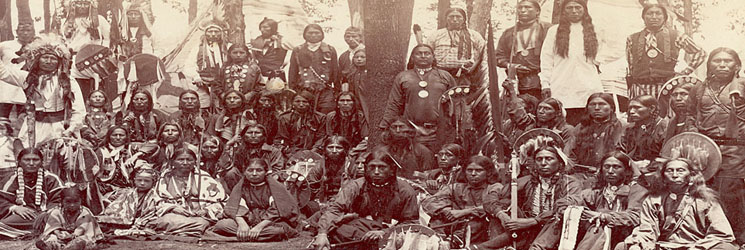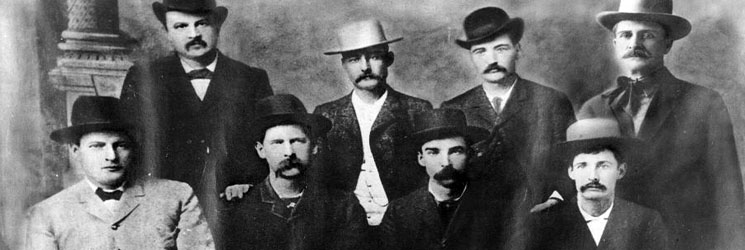1848 – 1889
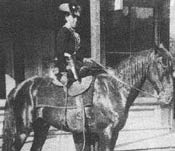
From her association with outlaws such as Jesse James and the Younger brothers, Belle Starr reached a level of notoriety that today leaves the facts of her life not always distinguishable from the fiction.
Myra Belle Shirley was born Feb. 5, 1848 in Carthage, Missouri. Her Father John Shirley was a wealthy Carthage innkeeper, while mother Elizabeth “Eliza” Hatfield Shirley was descended from the Hatfield part of the infamous Hatfield and McCoy family feud in the West Virginia-Kentucky region.
Belle moved with her family to Sycene, Texas shortly before Carthage was burned to the ground by Confederate guerillas during the Civil War in 1864. That same year her older brother John “Bud” Shirley, who fought for the Confederacy with William C. Quantrill’s guerillas, was killed by Union troops in Sarcoxie, Mo.
She attended the Carthage Female Academy, where she excelled in reading, spelling, grammar, arithmetic, deportment, Greek, Latin, Hebrew, and music-learning to play the piano.
As a teenager during the Civil War, Belle Shirley reported the positions of Union troops to Confederacy. One of her childhood friends in Missouri was Cole Younger, who served in Quantrill’s guerillas with Jesse and Frank James. After the war these men (and later Cole’s three brothers, among others) turned to outlawry, primarily that of robbery of banks, trains, stagecoaches, and people. In their flights from lawmen they would sometimes hide out at the Shirley farm, through which Belle became very tight with the James and Younger gangs. Their influence would be part of the reason Belle would turn to crime herself.
In 1866, Belle married James C. “Jim” Reed, a former guerilla whom she had known since her childhood in Carthage. Their daughter Rosie Lee “Pearl” (who was later rumored to be Cole Younger’s child) was born in 1868 and their son James Edwin “Ed” was born in 1871. While Jim initially tried his hand at farming, he would grow restless and fell in with the bad company of the Starr clan, a Cherokee Indian family notorious for whiskey, cattle, and horse thievery in the Indian Territory (now Oklahoma), as well as his wife’s old friends the James and Younger gangs.
Then in 1869, Jim shot in cold blood the man who supposedly accidentally shot his brother in a quarrel. He was wanted by the law, so he fled to California with Belle and Pearl in tow. Here two years later Jim again ran afoul of the law for passing counterfeit money and with Belle, Pearl and newborn son Ed, fled to Texas.
In November 1873, Jim Reed with two other men robbed Watt Grayson, a wealthy Creek Indian farmer in the Indian Territory, of $30,000 in gold coins. Belle was named as an accomplice, however, there was very little proof of her involvement. Nonetheless, they both went into hiding from the law in Texas: Jim in the town of Paris and Belle and the children with her family in Sycene. Allegedly, she took Pearl and Ed and went to Dallas, where she lived off the gold from the Grayson robbery.
She wore buckskins and moccasins or tight black jackets, black velvet skirts, high-topped boots, a man’s Stetson hat with an ostrich plume, and twin holstered pistols. She spent much her time in saloons, drinking and gambling at dice, cards, and roulette. At times she would ride her horse through the streets shooting off her pistols. This wild behavior was among what gave rise to her rather exaggerated image as a pistol-wielding outlaw.
In April 1874, Jim held up the Austin-San Antonio stagecoach and robbed the passengers of about $2,500. A price of $7,000 was placed on his head and he went into hiding. The law caught up with him near Paris, Texas on Aug. 6, 1874, when Jim Reed was shot to death while trying to escape from the custody of a deputy sheriff.
The young widow of an outlaw, Belle left Texas, put her children in the care of relatives, and took up with the Starr clan in the Indian Territory west of Fort Smith, Arkansas. Here Belle immersed herself in outlawry: organizing, planning and fencing for the rustlers, horse thieves and bootleggers, as well as harboring them from the law. Belle’s illegal enterprises proved lucrative enough for her to employ bribery to free her cohorts from the law whenever they were caught. When she was unable to buy off the lawmen, she was known to seduce them into looking the other way. All of these activities confirmed Belle’s status as an outlaw. During this period she married Samuel Starr, a member of the infamous Starr clan, in 1880.
Judge Isaac C. Parker, a.k.a., “The Hanging Judge,” of Fort Smith became obsessed with bringing Belle Starr to justice, but she eluded him at every turn. Then in 1882, charges of horse theft were brought against Belle and Sam by one of their neighbors in the Indian Territory. The jury returned a guilty verdict for each and in March 1883, Judge Parker sentenced Belle and Sam to a year in the House of Correction in Detroit, Michigan. During her prison term Belle proved to be a model prisoner and won the respect of the prison matron, whereas Sam was more incorrigible and was assigned to hard labor. Nevertheless, they were both released after nine months and returned to the Indian Territory. In fact Belle proved not to have been reformed at all by prison for she, as well as Sam, almost immediately returned to their villainous ways. Belle’s unrepentant attitude was best expressed in a comment to a Dallas newspaper reporter: “I am a friend to any brave and gallant outlaw.”
Over the next several years Belle Starr would continue to find herself arrested for charges of robbery, however, Judge Parker would be forced to release her for lack of evidence. A particularly memorable such arrest was in 1886, when Belle was charged with robbing a post office while dressed as a man. That same year Sam Starr was killed by a longtime family nemesis.
Shortly afterward Belle provided the legal counsel for Bluford “Blue” Duck, a Cherokee Indian indicted for murdering a farm hand. To Judge Parker’s ire, the death sentence he imposed was commuted to life imprisonment. And in 1888, when her son Ed was arrested for horse theft, her lawyers contacted President Grover Cleveland, who overturned Judge Parker’s seven-year prison sentence with a full pardon.
The notoriously unlawful life of Belle Starr came to a violent end on Feb. 3, 1889, two days short of her forty-first birthday. While riding from the general store to her ranch near Eufaula, Oklahoma, Belle was killed by a shotgun blast to the back. Suspects included Edgar Watson, with whom Belle had been feuding over the land he was renting from her (Watson was a fugitive and Belle had been told by the authorities that she would lose all of her land if caught harboring fugitives and for once she was obeying), her lover a Cherokee named Jim July with whom she had recently had a quarrel, and her son Ed, with whom she had had a strained relationship. However, the identity of the murderer of Belle Starr was never identified. Belle Starr was buried on her ranch with a marble headstone on which was engraved a bell, her horse, a star and the epitaph written by her daughter Pearl which reads:
“Shed not for her the bitter tear,
Nor give the heart to vain regret;
‘Tis but the casket that lies here,
The gem that filled it sparkles yet.”
Even in her lifetime Belle Starr had become a legend through the yellow journalism of her day. This status would be reinforced through the years by-in addition to the press-dime novel literature and the Hollywood motion picture industry. The result is that today historians continue attempting to decipher the facts of Belle Starr’s life from the fiction. (information courtesy of: Lakewood (Ohio) Public Library.)

